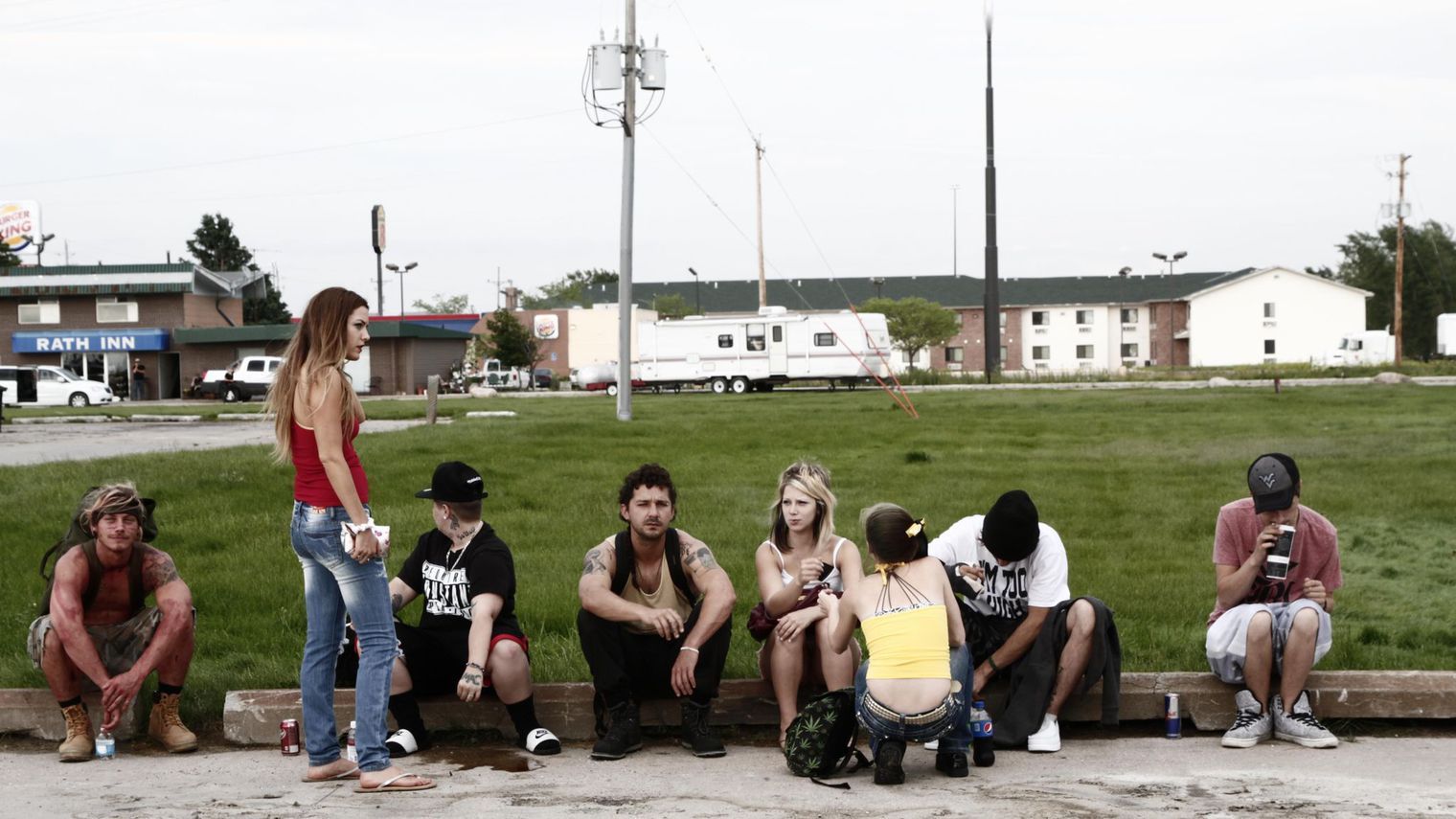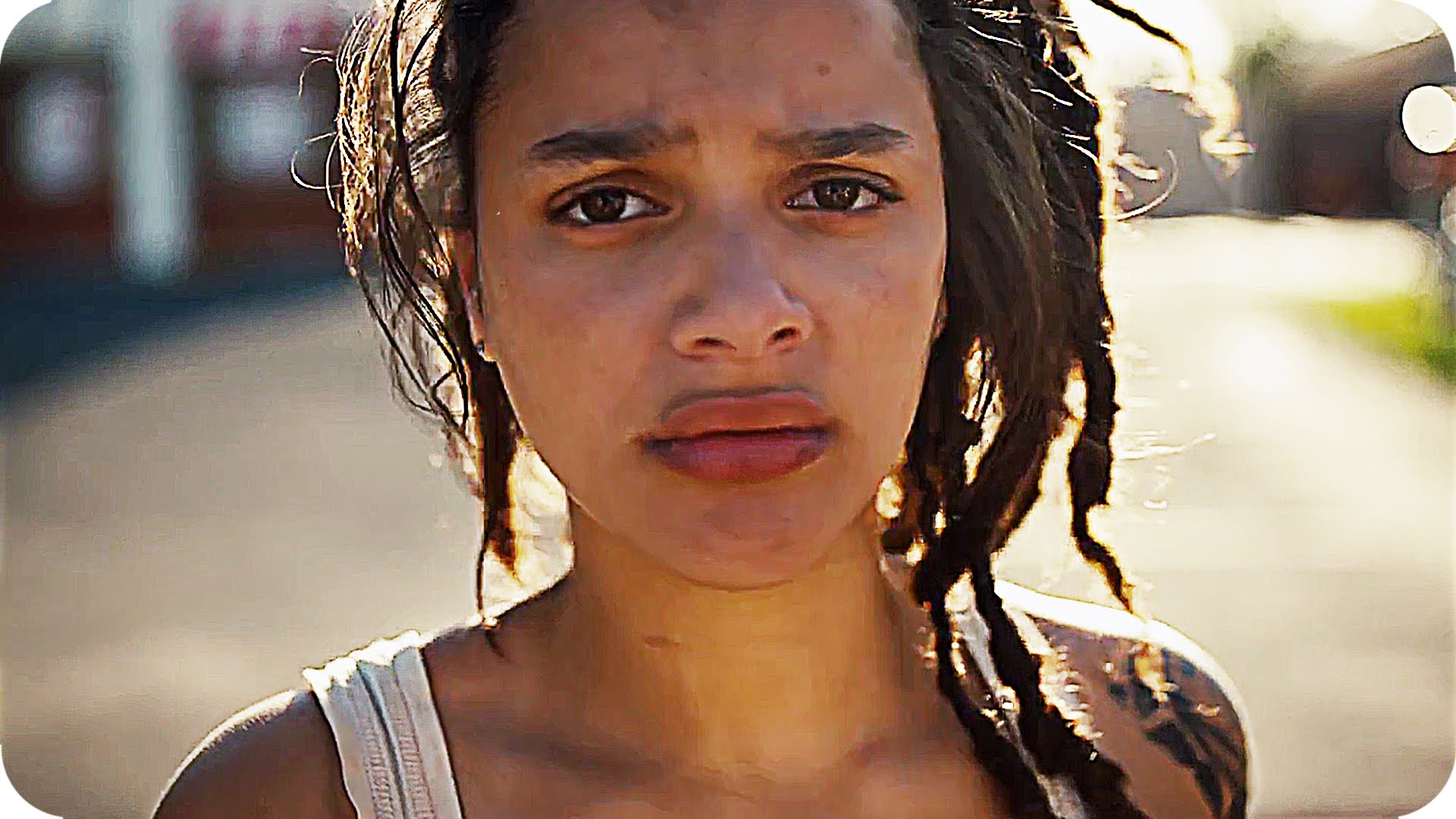Andrea Arnold’s poignant, uncomfortable “American Honey” is
difficult to categorize and a film you could spend hours dissecting. It’s a
coming of age story, a road trip film, a romance, as well as a lyrical and
unflinching portrait of poverty in the American heartland (specifically youth
poverty). However the film is also about (and it's the aspect I personally
found to be most moving) family and community; at the center of “American Honey”
is a tightknit tribe composed of those who don’t have anywhere else to go.
“American Honey” begins on a low note as our protagonist
Star, (Sasha Stone) dumpster dives with her two kid siblings. On the way home
she encounters a white van, full of rambunctious young adults including Jake
(Shia LaBeouf) who asks her to come with them. Star is tempted but ultimately
declines. However, things don’t get much better for her when the three return to
their cramped, decrepit home. Star and her siblings live with their creepy (step?)
father.
Newcomer Lane is magnificently understated in the role,
playing Star with a combination of resilience and naivety, empathy and stubbornness.
Star is trapped in a less than ideal home life and somewhat impulsively decides
to escape later that day, leaving her siblings behind with a family friend and
meeting up with Jake and the white van crew. They’re group of fellow
impoverished youths (in their late teens and twenties) traveling cross-country
to sell magazine subscriptions to rich suburbanites.
From there, the picture assumes a freewheeling,
slice-of-life structure as we follow the group from state to state, gas station
to gas station, seedy motel to seedy motel, where they party hard among other
things. This opportunity gives Star freedom from her miserable “family”
situation, in the form of a new makeshift family made up of fellow outcasts and
runaways. They’re a rowdy, rag tag group of kids who immediately welcome Star into
the fold. We spend a lot of time in the van with them or in motel parking lots
as they interact with each other and merrily sing along to rap music.
It’s a testament to Arnold and the cast that this group ends
up being as likable as they are. At first they come off like obnoxious,
mumbling wangsters. In one scene, when they dance and sing along to Rihanna’s
“We Found Love” in a retail store, with Jake even dancing on top a counter, I
rolled my eyes thinking: how am I going to spend two more hours with these
guys? Yet, the more time you spend with
them the more you come to like them. While not the smartest bunch (and
certainly still prone to bursts of obnoxiousness) they’re sketched as genuinely
nice, caring people with a lot to give.
The communal scenes (particularly the group sing-alongs in
the van) emit a strong sense of warmth and togetherness. In their previous
lives these people were neglected and stranded but here they feel appreciated
and are happy to be in one another’s company. During one scene near the end,
when they sing along to Lady Antebellum’s “American Honey” a feeling of joy and
comfort washed over me, as if I was traveling with them. In making the film,
Arnold and the cast pretty much took the same road trip that’s taken in the
movie. In interviews they talk about how much fun it was to make, how freeing
the experience was and how by the end they felt like a cohesive unit. That
sense of intimacy can be felt in practically every group scene in the picture.
I don’t want to say that Arnold romanticizes their situation
or poverty in general; there’s still a sense of danger and uncertainty within this
atmosphere of community and friendliness. We see this strongly in the
characters of Jake and Krystal, (Riley Keough) the leader of the group. Starting
with Jake, LaBeouf somehow manages to be charming and creepy in equal measure.
Smooth and convincing enough to make Star come along and become attracted to
him but also kind of rapey. When they first meet in a parking lot he sneaks a
kiss on her cheek. Not only that, Jake’s actions and behaviors become
increasingly unstable and unpredictable. This is perhaps the most fascinating,
complex character LaBeouf has played so far.
As for Krystal, she’s ice cold-- running the magazine
selling business with an iron fist, imposing strict and oddly sadistic rules.
On the one hand, boys and girls can’t stay in the same motel rooms and on the
other, the two lowest earners have to fist fight in a “loser night” for the
entertainment of the group. And if you go too long without earning she’ll abandon
you at the side of the road like a piece of trash. In other words, the sense of
freedom and connectivity Star and the others feel comes at a price; have too
much fun and Krystal will cast you aside. For her, this is a business, not a
family road trip.
At the same time, if “American Honey” doesn't romanticize
their situation, it also doesn’t (thankfully) wallow in tragedy and suffering. There
are about a dozen (a slight exaggeration) bad things that could have happened in this film but don’t. It’s not always a
pleasant watching experience but even the darkest scenes don’t quite go where
you expect them to go, creating a welcomed sense of tension and surprise. Dourness
can be just as forced and predictable as sentimentality and in “American Honey”
Arnold shows restraint. As uncomfortable as it can be, the film is more
optimistic than it initially seems.
In the end, the movie’s greatest flaw is running time.
“American Honey” clocks in at an epic two hours and forty-three minutes.
Considering the movie’s repetitive and plotless style you could easily cut twenty
or so minutes. As a result, I’m not eager to revisit the film in its entirety for
a little while. Even so, “American Honey” is an exceptional, compelling film
about a band of misfits that find their place--one that shouldn’t be missed.




No comments:
Post a Comment